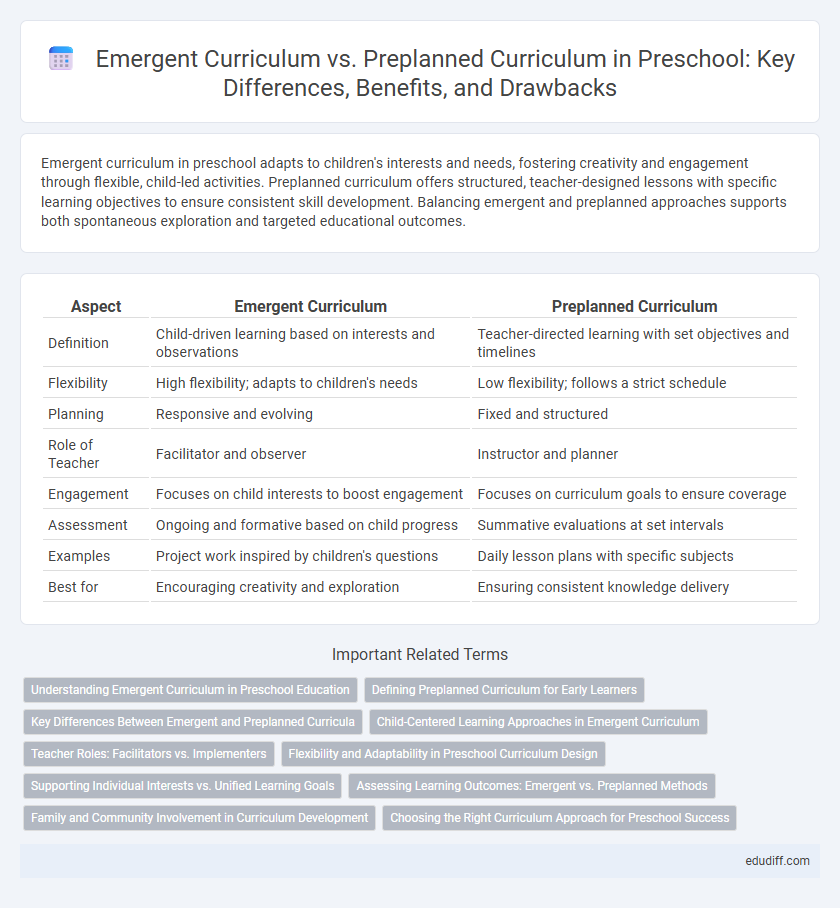Emergent curriculum in preschool adapts to children's interests and needs, fostering creativity and engagement through flexible, child-led activities. Preplanned curriculum offers structured, teacher-designed lessons with specific learning objectives to ensure consistent skill development. Balancing emergent and preplanned approaches supports both spontaneous exploration and targeted educational outcomes.
Table of Comparison
| Aspect | Emergent Curriculum | Preplanned Curriculum |
|---|---|---|
| Definition | Child-driven learning based on interests and observations | Teacher-directed learning with set objectives and timelines |
| Flexibility | High flexibility; adapts to children's needs | Low flexibility; follows a strict schedule |
| Planning | Responsive and evolving | Fixed and structured |
| Role of Teacher | Facilitator and observer | Instructor and planner |
| Engagement | Focuses on child interests to boost engagement | Focuses on curriculum goals to ensure coverage |
| Assessment | Ongoing and formative based on child progress | Summative evaluations at set intervals |
| Examples | Project work inspired by children's questions | Daily lesson plans with specific subjects |
| Best for | Encouraging creativity and exploration | Ensuring consistent knowledge delivery |
Understanding Emergent Curriculum in Preschool Education
Emergent curriculum in preschool education prioritizes children's interests, experiences, and developmental needs, fostering a dynamic learning environment that adapts to their evolving curiosities. This approach contrasts with preplanned curriculum by allowing flexibility and responsiveness, promoting deeper engagement and creativity in young learners. Teachers observe and document children's play and interactions to design meaningful, contextually relevant activities that support holistic development.
Defining Preplanned Curriculum for Early Learners
Preplanned curriculum for early learners involves structured, teacher-directed activities designed in advance to meet specific educational goals. It provides a consistent framework that ensures coverage of key developmental domains such as literacy, math, and social skills. This approach supports measurable progress through predefined objectives and routine assessments.
Key Differences Between Emergent and Preplanned Curricula
Emergent curriculum is child-centered, evolving based on children's interests, experiences, and interactions, while preplanned curriculum follows a fixed, teacher-directed structure with predetermined goals and content. The emergent approach emphasizes flexibility, responsiveness, and exploration to foster creativity and critical thinking. In contrast, preplanned curriculum prioritizes consistency, clear benchmarks, and standardized learning outcomes to ensure comprehensive coverage of educational standards.
Child-Centered Learning Approaches in Emergent Curriculum
Emergent curriculum emphasizes child-centered learning by adapting activities based on children's interests and needs, fostering engagement and creativity. This approach contrasts with preplanned curriculum, which follows a fixed schedule and predetermined content, limiting flexibility. Child-centered learning in emergent curriculum promotes individualized development and meaningful exploration in early childhood education.
Teacher Roles: Facilitators vs. Implementers
Teachers in emergent curriculum settings act as facilitators by observing children's interests and guiding exploration to foster natural learning pathways. In contrast, those using a preplanned curriculum serve as implementers who execute structured lesson plans designed to meet specific educational standards. The facilitator role encourages adaptability and responsiveness, while the implementer role emphasizes consistency and predetermined outcomes.
Flexibility and Adaptability in Preschool Curriculum Design
Emergent curriculum in preschool prioritizes flexibility by allowing educators to adapt lessons based on children's interests and developmental needs, fostering a personalized learning environment. In contrast, preplanned curriculum follows a fixed structure with predetermined objectives, offering limited adaptability to the dynamic classroom context. Emphasizing adaptability, emergent curriculum supports responsive teaching strategies that enhance engagement and promote holistic child development.
Supporting Individual Interests vs. Unified Learning Goals
Emergent curriculum prioritizes supporting individual interests by allowing teachers to tailor activities based on children's curiosity and developmental needs, fostering engagement and personalized learning experiences. In contrast, preplanned curriculum emphasizes unified learning goals with structured lesson plans designed to meet standardized objectives and outcomes across the classroom. Balancing these approaches can enhance early childhood education by integrating flexibility with clear educational targets.
Assessing Learning Outcomes: Emergent vs. Preplanned Methods
Assessing learning outcomes in preschool using emergent curriculum involves continuous observation and documentation of children's interests, fostering individualized and dynamic assessment tailored to developmental progress. In contrast, preplanned curriculum relies on fixed benchmarks and standardized assessments that measure specific skills and knowledge against predetermined learning objectives. Emergent methods emphasize adaptability and real-time feedback, while preplanned assessments provide structured data for evaluating overall program effectiveness.
Family and Community Involvement in Curriculum Development
Emergent curriculum fosters family and community involvement by encouraging educators to incorporate children's interests and cultural backgrounds, creating dynamic learning experiences that reflect the local environment. Preplanned curriculum often limits such involvement by following predetermined objectives and standardized content, reducing opportunities for families to influence the educational process. Engaging families in emergent curriculum development enhances collaboration and supports culturally relevant education tailored to community values.
Choosing the Right Curriculum Approach for Preschool Success
Emergent curriculum in preschool emphasizes child-led learning through observation and responsiveness to children's interests, fostering creativity and engagement. Preplanned curriculum follows a structured, teacher-directed approach with specific learning objectives to ensure consistent educational outcomes. Selecting the right curriculum approach depends on balancing flexibility with structure to support developmental milestones and individual learning styles effectively.
Emergent curriculum vs Preplanned curriculum Infographic

 edudiff.com
edudiff.com